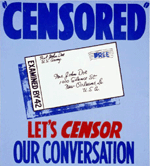 A Brazilian judge may impose a ban against access to all WordPress.com blogs because a single blogger posted an adult content video. In order to block access to the offending blog, because of the identical IP address, it might be necessary to deny access to all WordPress.com blogs. You can read the details at “Brazil: Bloggers united against WordPress ban.”
A Brazilian judge may impose a ban against access to all WordPress.com blogs because a single blogger posted an adult content video. In order to block access to the offending blog, because of the identical IP address, it might be necessary to deny access to all WordPress.com blogs. You can read the details at “Brazil: Bloggers united against WordPress ban.”
In her post “WordPress.com Banned Again: Why Aren’t You Concerned?”, Lorelle VanFossen raises two issues:
(1) the apparent lack of blogger interest in fighting such bans; and
(2) to what extent WordPress.com as a whole should be responsible for the misconduct of a single blogger.
Let me tackle these issues separately.
1. Free Speech.
From a U.S. citizen’s point of view, an ideal world would have the same constitutional freedom of speech protections that we enjoy — and it should be a goal worth fighting for because such is directly tied to other personal liberties. Yet as a practical matter, speech rights are limited in most countries. For example, criticizing Islamic extremists in a Canadian blog or forum can lead to civil suits and prosecution for human rights violations in a PC society that has run amuck with moral relativism.
In short, we should promote free speech but not expect it where there is no constitutional protection for it.
2. WordPress.com Liability.
Lorelle correctly lays primary responsibility on the individual blogger rather than WordPress.com as a whole. Where we disagree is her contention that WordPress.com should be liable only up to the amount one pays to blog.
As we’ve seen with recent lawsuits against Craigslist and others, the less involved a site is in screening the content, serving instead as a mere conduit of information posted by third parties instead of as the author of such content, the more likely the site’s, owner, host, and webmaster will be absolved of liability for offending content.
Indeed, one has to wonder if it is even technologically feasible for a WordPress.com, Craigslist, YouTube, etc. to effectively police with preemptive actions to comply with applicable laws around the world. I’d contend that it isn’t possible to do it right.
Because of this, absent facts showing that WordPress.com was knowingly involved in the promulgation of the video in question, I don’t believe the site should owe anything. Period. End of story.
However, I do agree with Lorelle’s argument that WordPress.com should provide judges with the technical information necessary (if feasible) to block a single offending blog so that innocent bloggers are not punished for the misconduct of one blogger.
What do you think?
In your opinion, what are WordPress.com’s responsibilities?
